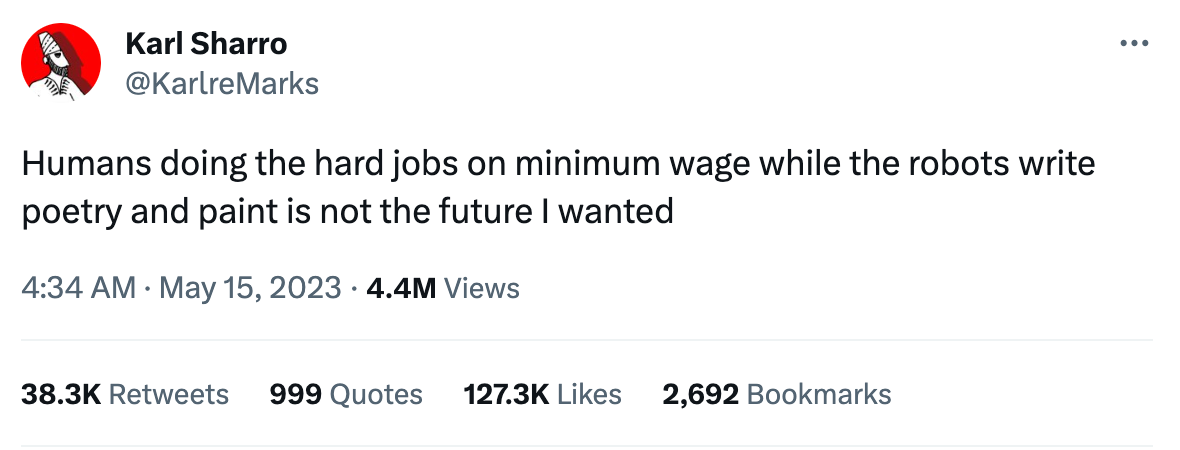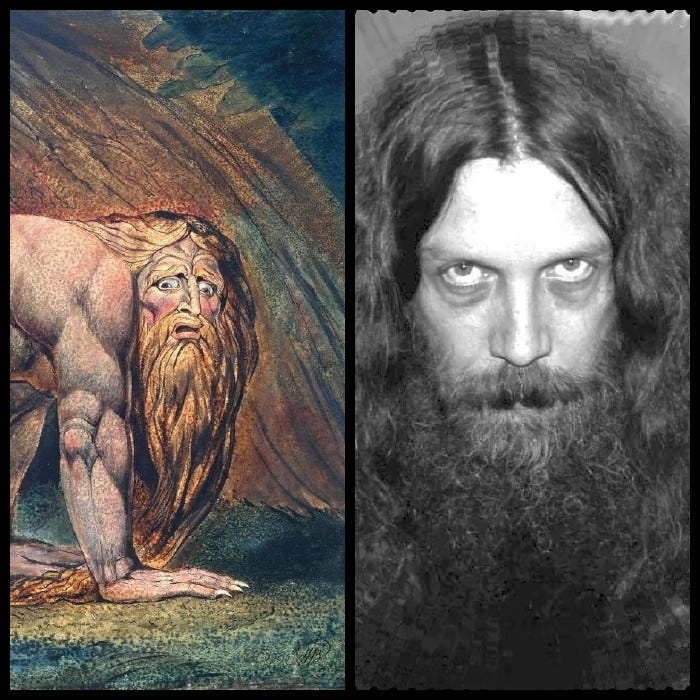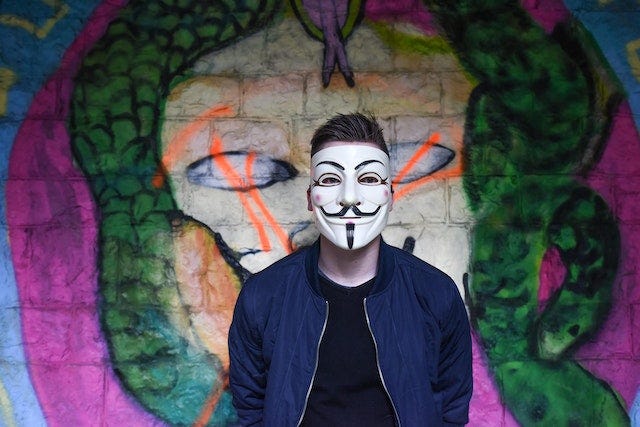My favorite internet publication is going out of business this week. The Nib published political cartoons, mostly on the internet, but also in the form of stunning themed magazines which I now own every one of (you can buy them here), with the exception of the art I cut out of them and hung on the bulletin board over my desk. The Nib was founded by artist Matt Bors — most famous for the “Mister Gotcha” meme — in 2013, and managed to struggle along through the internet’s worst era for just shy of 10 years.
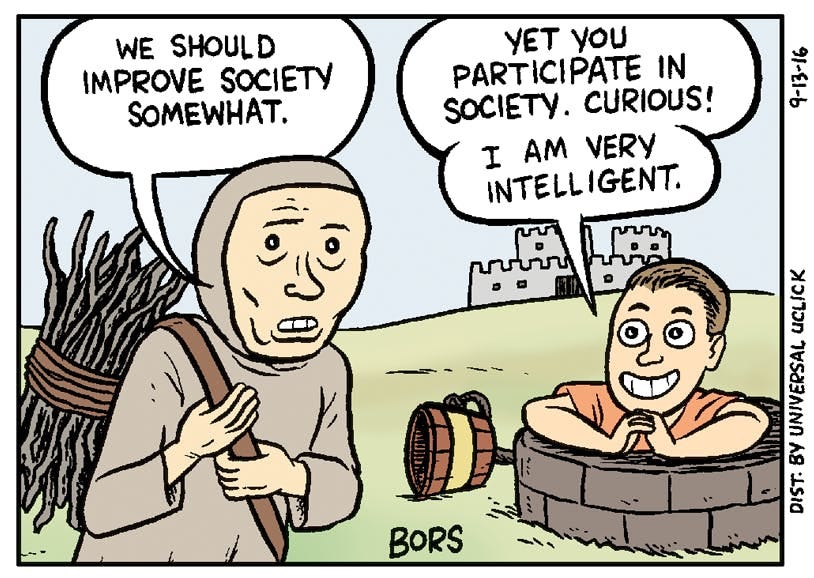
The art they made was unapologetically left-wing and pro-human: the artist staff was diverse and phenomenally talented. They always punched up, they never punched down. They published dope shit like:
Ben Passmore’s unapologetically radical anarchist cartoons
A crowd-funded compendium of comics by queer artists titled Be Gay, Do Comics
Mattie Lubchansky’s swole, communist Dilbert
Mike Dawson’s lovely comic on “life in interesting times”
Erlend Sandøy’s visually stunning history of Green Parties (which literally came out in the Nib’s last week)
And a trillion other things that brought me joy during this dogshit decade. Unfortunately, this is the era where billionaire ghouls own the publishers (the “memes of production,” if you will) and artists and writers live in near-poverty so the world’s worst people can have even more money to be the worst with.
This comes at a time where it seems that America’s entire creative class is revolting: the Screen Actors Guild, led by Our Red Queen, Fran Drescher, is striking because actors are getting shafted on streaming royalties. The Writer’s Guild of America beat them to the punch by about a month, in part over streaming, but also over the issue of whether studios should be allowed to steal their work and funnel it into AI so they don’t have to pay those pesky writers at all in the future.
We are such a fundamentally disempowered society that most of us have taken the appearance of AI art and writing and have said, “welp, can’t put the genie back in the bottle, this is the future.” But it very obviously doesn’t have to be the future, because using AI to create the art we consume is an absolutely dogshit idea that clearly benefits no one but the rich owners of media corporations. In a society where the people actually held the power, we’d say, “nah, we’re not going to do that, also, why do you own a spaceship? You have too much money. Give it back.”
AI could be relegated to doing fun filters on TikTok or Snapchat that build our self-esteem, and to writing boring ad copy that no real writer actually enjoys.
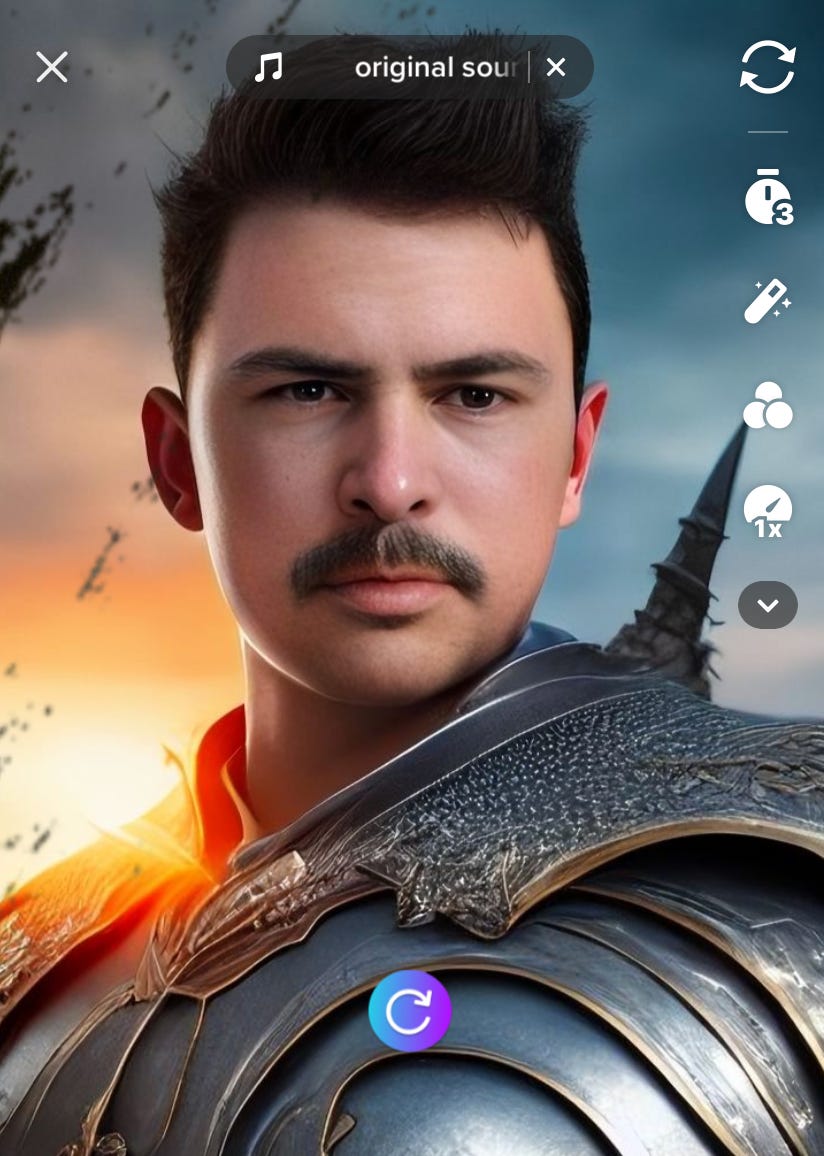
It is not a huge surprise that this is happening: the creative class that is my age and younger came up in a time where our success relied heavily on our ability to build an audience on social media, and in order to do that, you have to give away a lot of your work for free. This was the explicit business model of companies like Facebook, who understood early on that the goal of social media was not to give people access to the whole internet, but to catch their attention and hold it on their platform. In doing this, they drove countless publications out of business and, as a side effect, dealt a mortal blow to many of the world’s democracies.
(I wrote more on how they did this earlier on this week’s Book Rex, if you’re interested.)
Book Rex: Traffic
I spent the bulk of the 2010s working as a “content creator” online for a travel publication. It was meant to be my dream job — I’d fantasized about being a jetsetting journalist since I was a teenager — but after the 500th time I told someone what I did and they said, “That must be
Art as magic
As someone who has worked as a “content creator” during this degrading-ass time to be an artist, I’ve found hope in the ideas of famed comics writer Alan Moore. When Moore is covered by the press, it’s normally as a cantankerous old kook who is mad that they’re making another adaptation of his work.
On paper, he sounds like a kook. Moore calls himself a magician, but not like your Davids Blaine or Copperfield: he is an actual magician, and dabbles in the occult. He worships a snake god with a fabulous head of hair, and just in terms of looks, he resembles William Blake’s painting of Nebuchadnezzar.
But when you start to actually explore Moore’s worldviews, they begin to sound disturbingly sane. He calls himself a magician because he believes magic and art are one and the same. Artists manage to take something that exists only in their brain and bring it into the actual world. If anything is an act of conjuring, then that is it: literally anything we interact with that is manmade must have existed in someone’s mind before it was brought into the world.
Moore bolsters this stance by pointing out that the language of language and the language of magic are one and the same: magicians cast spells, they curse the people they dislike, even their magic book, the grimoire translates simply to “grammar.”
The reason Moore is so prickly towards movie studios and comics publishers is that he takes this magical work somewhat seriously. The act of bringing an idea into the world is no small job, and Moore has seen his own ideas grow beyond his control (most notably in the Guy Fawkes mask from V for Vendetta, which has become a worldwide symbol of anarchist resistance).
When Moore discusses the history of magic, he points out that at one point, artists/magicians were immensely powerful. They served as shamans and storytellers, they told societies who they were, they helped people build their identities and ridiculed those in power: a shitty leader could be killed in battle, which would suck for them, but it wouldn’t suck as bad as being memorialized for all eternity in a satire that portrayed them as dumb or ineffectual. Warriors had power over life, but artists had power over eternity.
It is understandable, then, that the powerful would attempt to control the creative classes. If you manage to keep the artists (or “creatives” in today’s weird Newspeak-y parlance1) poor and dependent on the rich, then they can be forced to prostitute their powers to write advertisements, or towards making more safe and “marketable” content, like the 700th superhero movie remake.
If, on the other hand, the creative/artist class could be convinced that what they are doing matters, if they could be shown that we need people to imagine a better world before we can build it, and that they can lead the way, we might actually have a chance at escaping the worst case scenario for this planet. AI simply can’t do that — AI is imitating the work of other artists. It doesn’t create new ideas, it just reforms old ones. What we need are new ideas, and we’re not going to get that without human creativity.
The era we live in will be quick to write off this sort of belief in creativity, originality, and magic as naive or pretentious or cringe, but that’s fine. The world’s artists seem to be standing up and saying, “we’re worth something” while the billionaire owners of the studios and media corporations scoff at them from their yachts. What they miss is that old world’s always collapse, eventually, and when they do, we rely on the artists and the visionaries to build new ones.
The Nib may be gone, but the artists that wrote it are not. May the new world they build be one in which they own their work and are recognized as the visionaries they are.
I also fucking hate calling it “content.” What a boring, neutered word for art.




